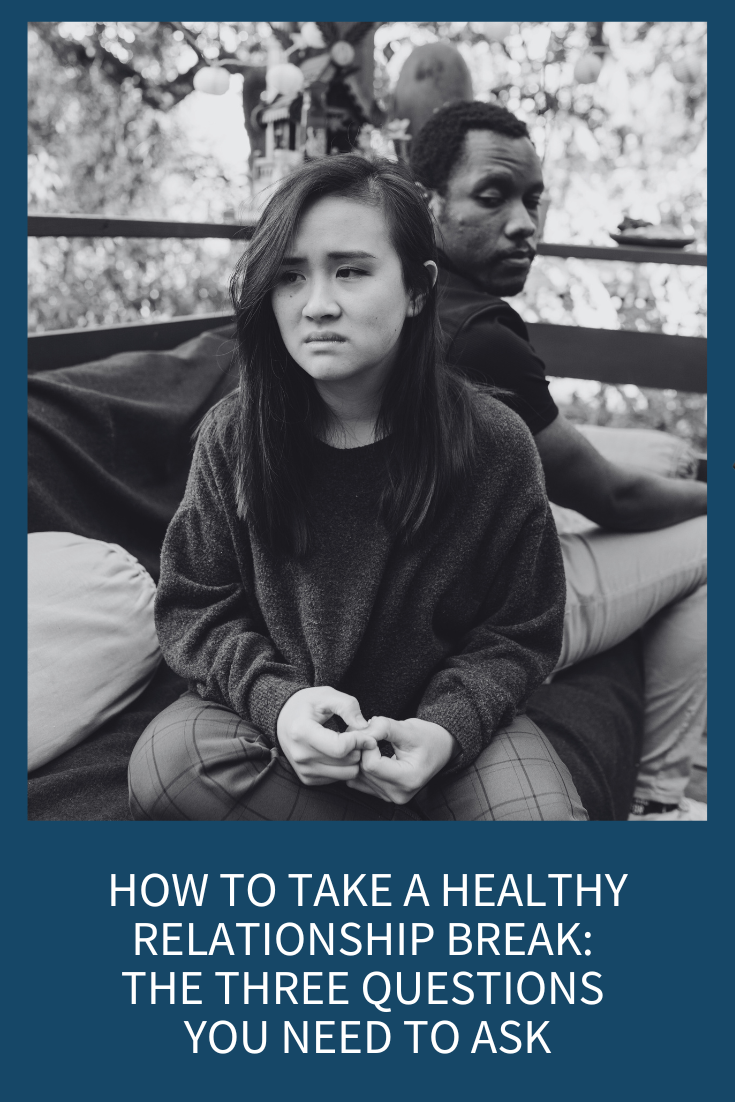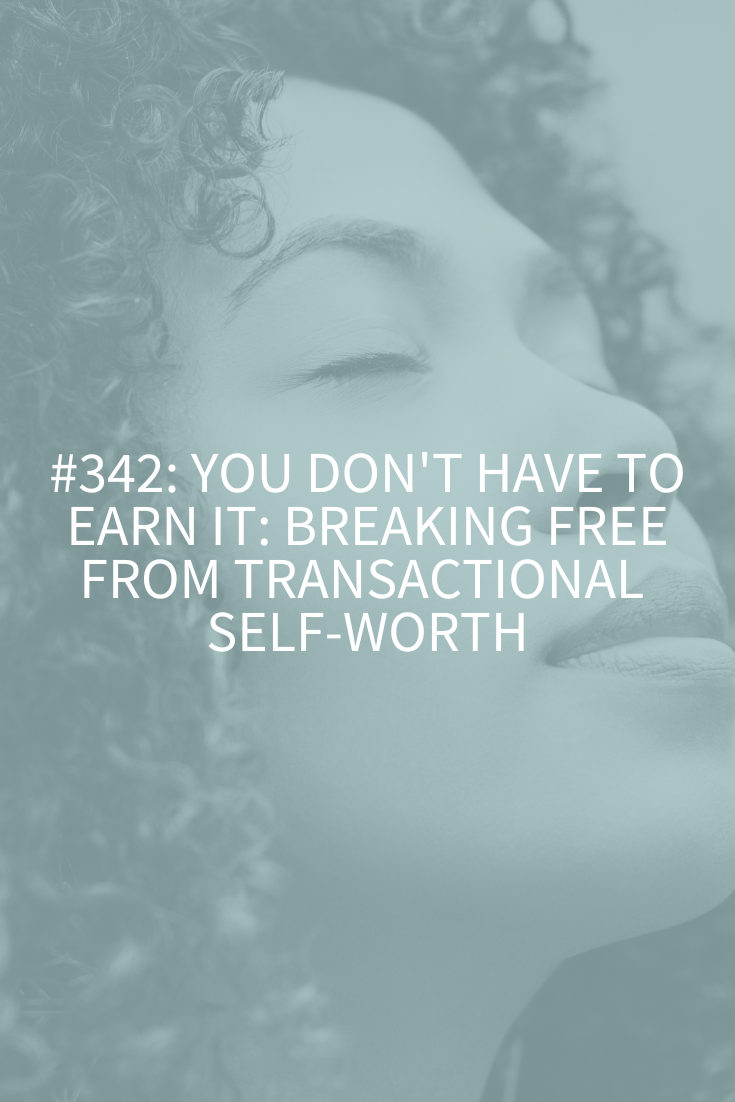
If you’re like me, when you think of a relationship break, you’re remembering Ross Gellar on the show Friends, screaming, “We were on a break!” Well, let me tell you, that was not the right way to take a relationship break. But there is a healthy way to take a relationship break and you do it by asking (and answering) three important questions.
8-minute read
Let me say first that I had an incredibly hard time finding any research on whether or not relationship breaks are healthy. There are a ton of opinions out there and some very small studies, which are hard to extrapolate to a larger pool. So, today I want to be clear that I’m mostly speaking from my own (almost four decades) of experience.
In my (humble) opinion, a relationship break can be healthy if both partners are motivated to work on themselves and their own issues so they can grow in the relationship and work out issues that have previously been stumbling blocks. A healthy relationship break isn’t a vacation from the relationship. Instead, it’s a way to put on the pause button temporarily so you can gain greater clarity into the issues you bring into the relationship, why you’re triggered in certain situations and what is creating upset or unhappiness for you. If you can get better at your emotional regulation and identifying ways you can change (instead of focusing on what your partner needs to do) relationship breaks can be a relationship saver.
Bad Reasons for a Relationship Break
As I said, a healthy relationship break can save a relationship and set it on a new, productive and exciting course. However, an unhealthy relationship break will create distrust, resentment and push the two of you further apart. An unhealthy relationship break often happens because it’s time to actually break up, but that feels too painful. So, before we get into what works, let’s discuss what doesn’t.
First, you want to avoid multiple cycles of relationship breaks and then getting back together. This is something researchers call Relationship Churning (this is more common in younger adults), and outcomes in the research show a propensity for violence, trauma, and lower self-esteem when couples are caught in this cycle. If this is your second or third break, you’re likely in an unhealthy cycle and it’s time for formal counseling or to finally call it quits for good.
Other unhealthy reasons to take a break (and a signal that maybe it’s time to break up instead) include:
- If you or your partner is interested in pursuing a relationship with another person
- When you or your partner is interested in having sex with other people. We’ll talk about open relationships and whether that’s right for you next week.
- When you really want to break up, but you think this will be easier, and you’ll be letting your partner go more gently this way.
- You’re in an argument or the heat of the moment and you’re fed up, so you ask for a break. The decision to take a break should be made from a calm place.
- If one of you wants it but the other doesn’t. When it’s not mutual, this creates distrust, resentment and undermines the relationship. Not being able to create agreed-upon ground rules for issues is a sign that you might not be able to move forward.
- If you or your partner is threatening a break as a means of manipulation to get what you (or they) want.
If you’re caught in any of these unhealthy reasons/patterns, you might be trauma bonding. It’s important to learn about trauma bonding so you can stop unhealthy cycles.
Now let’s get to the three questions you need to ask (and answer) to take a healthy relationship break.
Question #1: What’s the Motivation?
The goal of a healthy relationship break is to come back to the relationship with a renewed sense of enthusiasm, commitment and passion.
With that in mind, healthy reasons to take a break include:
- To focus on taking care of yourself. Many people get lost in a relationship and have difficulty prioritizing their own needs when they’re with someone else. Or you might discover a mental health issue you didn’t know was there or one that’s been exacerbated. Taking a break can be useful to focus on yourself and not blame the other person or put off self-care because you’re focused elsewhere.
- Work or something else such as a parent needing you to move back in, is requiring you to be at a distance from your partner anyway. These can be great natural times to step back a little as you focus on your here and now situation.
- If you’re in a negative cycle you can’t break. You’ve tried therapy and other things but you continue to trigger one another. Distance physically and emotionally might be helpful to realign your values and get perspective.
- Wanting fundamentally different things. It’s more common than you think to fall in love with someone and start building a life together only to later discover that you want different things. You’ve discovered over the course of the relationship that you want kids and your partner doesn’t, or they don’t want to get married and you do, or maybe they now want an open relationship and you don’t. Maybe your partner wants to save every penny while you’d rather travel and live life to the fullest.
It might be helpful to think of taking a break from a relationship the same as you would from taking a break from a job. Why would you take a break from a job? You’re not sure if that career is for you. You feel overwhelmed with what’s being asked of you. A mental health issue or medical issue has come up that requires your full attention. Any of these could be reasons you feel like you need to step back and re-assess your values and what you truly want and need.
No matter what, you need to first identify the reason you or your partner (or even both of you) want to take a break. This is ground zero, and if you or your partner can’t identify the motivation, that’s a huge red flag. It means someone is lying and doesn’t want to hurt the other’s feelings and starting a break from a place of deceit is a big problem.
Question #2: What’s Our Definition of Our Relationship Break?
There is no absolute definition of what taking a relationship break means because it can be different for every couple. So, the most important thing when taking a break is to have a mutual and very clear definition of what a relationship break is for the two of you.
No matter what, a relationship break is not a holiday from the relationship. This isn’t about temporarily separating and then jumping back in wherever you left off. There needs to be some changes that happen during the break, or the break won’t be helpful.
Your relationship isn’t “on hold” during a break. You’re working on it, separately. Don’t look at what others have done. Have an open and loving conversation about how you want to define your break, given your motivations identified in question one.
These can be difficult conversations, so learning to listen without getting defensive or hurt is key to a healthy discussion!
Question #3: What are Our Rules for Our Relationship Break?
Now that you know your motivation and how you want to define your relationship break, there are a few very specific things that should be agreed upon if you take a relationship break:
- Decide on how long this break will be. It should have a definite beginning and end.
- If you live together, someone needs to move out. You can’t truly take a healthy break if you’re still living together. Close proximity makes it very hard to truly take a break. It’s not impossible but, in my experience, I haven’t seen it work. So, who’s going to move out?
- If you’ve been cohabitating, how will you manage paying bills that were combined? When you add another living space, how will that be absorbed monetarily?
- Agree to ground rules around how often you contact one another. When and how is it OK?
- If you have shared pets, what are the rules around them?
- Agree to ground rules around sex and dating other people. Personally, if the break is to have sex or date others, I think it’s time to break up. Yes, I said it!
- Agree on what you’ll each be doing during this break as you work on yourselves. This is not a time for one of you to “wait around.” If both people aren’t willing to do work on themselves, you can’t take a healthy break.
- When you do reconnect, what are the rules? Are you “back together,” or are you going to take a longer break? Do you have new needs you’ve identified? Is it time for therapy at that point together?
What Should You Do on the Relationship Break?
- You both seek individual therapy or some other kind of emotional growth (travel, spiritual paths, etc.)
- Keep a journal of what you’re learning about yourself and the relationship. When you come back together first and foremost, share these learnings. Ask questions of one another to deepen your understanding of your partner.
- Whenever you find yourself focusing on your partner, focus on yourself instead. What work do you need to do here?
- Identify what makes you feel connection, ease and joy outside the relationship.
- Identify your needs (not thinking about what your partner can or cannot do)!
- Complete the What I Want in a Love Relationship worksheet.
- Read my book, Boundaries Made Easy: Your Roadmap to Connection, Ease and Joy. And do the tips and journaling included in the book!
Research and Resources: How to Take a Healthy Relationship Break: The Three Questions You Need to Ask
2019 Study on Marital Separation
Are You Trauma Bonding in Your Relationships and Don’t Realize It?






